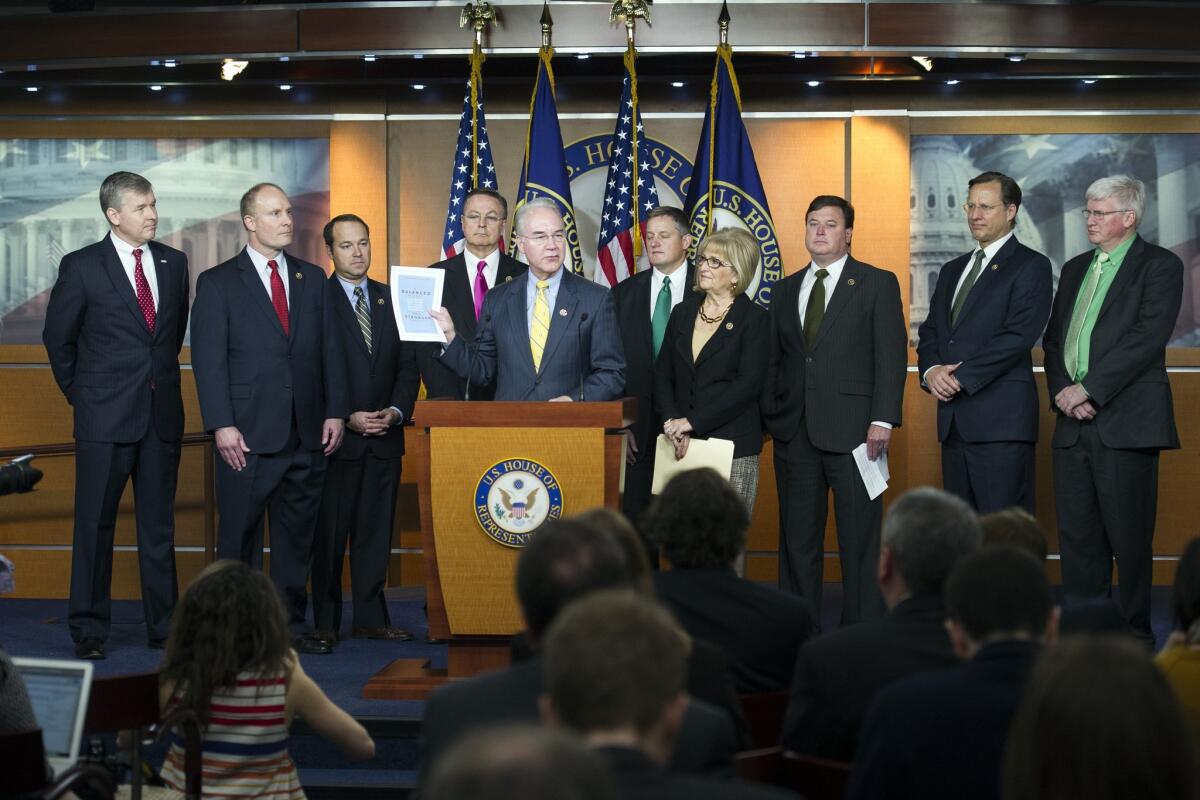GOP uses a little ‘parliamentary contortionism’ to advance budget

The budget battle between President Obama and congressional Republicans isn’t nearly as engaging as the one among Republicans themselves.
Speaker John A. Boehner (R-Ohio) once again is trying to lead a House majority with divergent goals -- splintered between defense hawks who want to raise military spending and deficit stalwarts who want to keep government spending low.
The internal debate over Republican priorities spilled into the open Thursday as leaders tried to shore up support for the party’s $3.8-trillion spending plan.
It all started late Wednesday in a grueling all-night session of the House Budget Committee.
The budget, as written by Chairman Tom Price (R-Ga.), included a $20-billion boost in military money, using an account for overseas war operations that falls outside strict budget caps.
But mindful that his committee is dominated by deficit sharks, Price made the military money contingent upon finding cuts elsewhere to offset the increase. Without such language, Price worried the budget would not pass his committee.
Military supporters, however, balked at the contingency, betting that the Pentagon would never see the extra money because a deal to cut spending elsewhere would be too hard to reach.
GOP leaders realized they were in a bind. Though the budget committee includes many deficit hawks, Pentagon supporters could flex their muscles when the bill came to the full House floor, possibly tanking it.
“The goal was to be sure there was a bill on the floor that could pass,” said one GOP aide unauthorized to discuss the private negotiations.
In some last-minute maneuvers, leaders floated an amendment that would have removed the contingency language. But the effort crumbled as committee members revolted over the meddling.
By early Thursday morning, the committee approved the budget -- with the contingency.
It was a victory of sorts for the deficit hawks, but one that was short-lived.
Within moments of the committee vote, leadership announced it would try again to guarantee the military money by using a procedural vote next week, when the budget comes to the full floor.
“There is overwhelming support in our conference for providing additional resources to protect our national security,” Boehner said Thursday.
Some GOP lawmakers called the outcome as a fair compromise.
“I was pretty impressed with the creativity here -- I won’t call it political gymnastics, but it certainly could be called parliamentary contortionism,” said Rep. Trent Franks (R-Ariz.), who considers himself both a defense and deficit hawk, and is likely to back the budget. “We’ve done the best that could be done in a difficult circumstance.”
Passing a budget will be crucial for Republicans, who now control Congress for the first time in eight years. They had repeatedly criticized Democrats for their failures to approve a spending plan.
Even more important for the GOP, the budget process gives Republicans their best procedural tools for passing other measures -- including a repeal of Obama’s healthcare law -- on a simple majority vote, circumventing Democratic filibusters.
Though Obama could still veto such bills, the promise of passing a bill to undo the Affordable Care Act has become a strong pull to convince the deficit sharks to go along with the extra military spending, without contingencies.
Obama has sharply criticized the overall GOP blueprint as more of the same trickle-down economics that provide tax breaks in hopes of spurring economic growth, while deeply cutting domestic programs, including Medicare.
The president has also proposed increased Pentagon spending, but as part of a package that lifts budget caps on other domestic accounts, paid for with tax hikes on the wealthy.
Republicans overwhelmingly oppose the president’s approach. But whether they support their own remains a work in progress.
For the latest from Congress, follow @LisaMascaro
More to Read
Start your day right
Sign up for Essential California for news, features and recommendations from the L.A. Times and beyond in your inbox six days a week.
You may occasionally receive promotional content from the Los Angeles Times.







